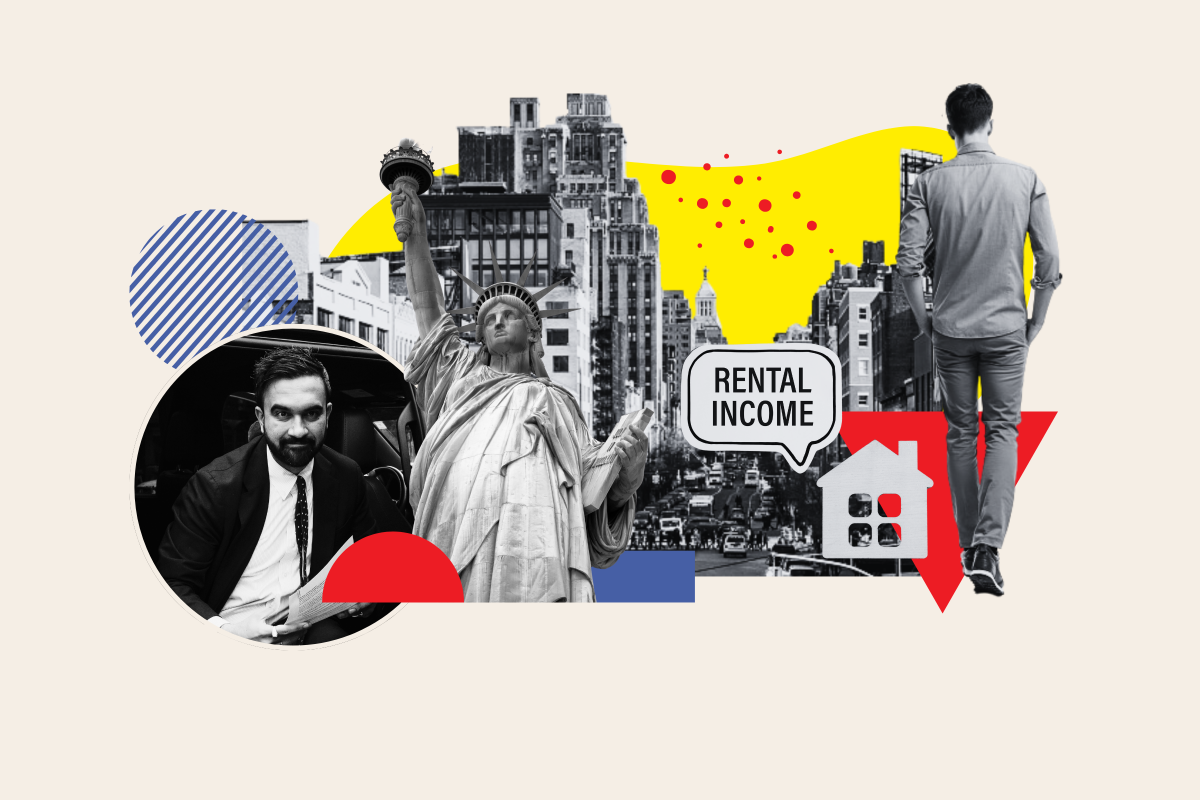Zohran Mamdani’s stunning victory in New York City’s mayoral primary race has blindsided local landlords and real estate professionals, who poured millions into Andrew Cuomo‘s campaign, hoping to stop the young, left-wing candidate’s ascent.
Now, they are scrambling to block the 33-year-old state politician from City Hall, where the self-described Democratic socialist is likely to keep his promise to freeze rent for over 2 million New Yorkers and reform the city’s tax system to make “richer and whiter neighborhoods” pay more.
A Victory Fueled By Renters
Two-thirds of New Yorkers rent their homes in what is one of the most expensive markets in the country. About 44 percent of all rental units in the city are rent-stabilized—which means that there are limits to how much landlords can raise rent each year. In the city’s free market, on the other hand, landlords can increase rent by how much they see fit.
But even in the rent-stabilized market, renters are struggling to keep up with the cost of housing, which has risen all across the country since the pandemic.

Photo-illustration by Newsweek/Getty/Canva
According to data published last year by the NYC Comptroller Brad Lander, a majority of renting households in the city are rent-burdened—which means that they spend more than 30 percent of their income on rent. Nearly 30 percent of low-income renters across the city’s five boroughs are severely rent-burdened, according to Lander, which means that they spend more than 50 percent of their pre-tax income on housing.
Many are having a hard time staying housed. In 2023, according to the latest figures available, there were more than 132,000 evictions in New York City, more than double those reported in 2021, according to Eviction Lab.
In this scenario, Mamdani’s campaign promise to freeze rent for those living in rent-stabilized apartments—about 2.4 million New York City residents—was bound to garner enthusiasm among more than a few New Yorkers.
The primary race’s results show that many have been responsive to Mamdani’s promise: except in the Bronx, tenant-majority areas of NYC largely voted in favor of the young candidate, according to data from the New York Board of Elections.
Why NYC Landlords Hate Mamdani’s Agenda
Whereas renters are excited about Mamdani’s campaign pledges, the city’s landlords are raging against them. According to Kenny Burgos, head of the New York Apartment Association (NYAA), one of the largest landlord trade groups in the city, Mamdani’s agenda is “a recipe for disaster” for New York City’s rental market.
Mamdani, Burgos said, is focusing on tackling affordability in what is already the most affordable part of the city’s rental market—instead of the so-called free market.
“There’s rent-stabilized market and there’s the free market, where prices continue to increase as a result of the rent-stabilized market, because there’s less turnover, less supply coming online, all that,” Burgos told Newsweek. “All these properties [the rent-stabilized units] have the same costs [for landlords] when it comes to property taxes, insurance, water, sewer, labor, you name it, the costs are the same,” he said.
The latest data available show that New York City’s rent-stabilized unit landlords’ profits were up by 12.1 percent between 2022 and 2023—but Burgos said that smaller owners are struggling.
In areas like the Bronx, Burgos said, rent-stabilized landlords have some of the lowest revenues and are facing the highest costs—including home insurance, which he said has tripled in the past five years.
“This is almost a tale of two cities. And this is why the policy that Mamdani is pushing forth is so dangerous,” he said. “We’re in the middle of a crisis that he will inherit, that he will accelerate, and that will destroy the housing market in New York City.”
An Unsustainable Situation for Smaller Owners
Experts back Burgos up. Howard Slatkin, executive director at Citizens Housing & Planning Council, an independent housing research and education nonprofit working in NYC since 1937, told Newsweek that rents are so high in the city for many reasons—including the cost of upkeep for owners.
“One is the overall undersupply of housing, that in essence pushes upward the ceiling on unregulated rents, and creates an effective zero vacancy rate for low-cost apartments,” he said. “But there is also a floor for rents, and that is the cost of operating a building. If revenues (mostly rent rolls) don’t cover these expenses—repairs, staffing, utilities, taxes, regulatory compliance—then owners can’t maintain the housing,” he added. “And these expenses have been rising.”
According to Burgos, Mamdani is campaigning “on handicapping the revenue of 40 percent of New York City’s rental market,” he said. “Property owners don’t have the luxury and ability to up and move their businesses, like maybe some grocery stores and other retails. They are forced to survive under the threat of being handicapped on their revenue while expenses continue to rise,” he added.
Slatkin agrees that freezing rents on rent-stabilized apartments would likely see the most affordable buildings, with the lowest current rents, struggle the most to cover their expenses.
“This problem is already visible in financial data about rent-stabilized buildings in the Bronx, for example,” he said. “And this is what nonprofit affordable housing providers are reporting. Freezing rents without bolstering revenues would exacerbate the problem.”
As rent-stabilized prices will accelerate across the city, Burgos said, “you’re going to see a lot more properties on sale,” as it happened after a 2019 law capping rent increases on stabilized units came into effect. “You’re gonna see foreclosures. You’re going to see disinvestment,” Burgos added. Landlords who are not going to sell their properties, Burgos said, are likely to defer maintenance because they cannot afford it, causing renters to live in subpar housing.
Crucially, Mamdani’s proposal to freeze rent would not apply to newly constructed rental units.
Burgos is hardly the only one to raise alarm bells over the way landlords would react to Mamdani’s policies. Many among the wealthiest ones, real estate experts say, would likely leave the city and relocate in places like Miami, Florida.
“Our clients who own buildings across NYC are deeply concerned about the rent freeze tied to Mayor Mandani’s agenda,” Jay Batra, a real estate entrepreneur and the principal of Batra Real Estate, a full-service real estate brokerage in New York City and Miami, told Newsweek.
“Landlords are facing mounting pressure—with high taxes and operating costs, it’s becoming unsustainable to hold properties without the ability to adjust rents. Many are now evaluating out-of-state investments as a safer, more profitable alternative.”
A Different Type of Solution Needed
Peter Zhao, a licensed real estate agent based in Nassau County managing ‘buy, sell, rent’ deals throughout parts of NYC, recognizes that the housing affordability crisis in the city must be urgently addressed—but doubts that freezing rent can solve it alone.
“A freeze on rent-stabilized units protects current tenants but leaves market-rate and new rentals untouched, offering no help to new renters or alleviating overall affordability pressure,” he told Newsweek.
Zhao grew up in Queens and lived in rented properties for two and half decades before he became a homeowner. He now sees himself as “a tenant-advocating agent,” and he believes that everyone involved in the housing market needs to come together to solve the current crisis—developers, landlords, renters, and regulators.
“America’s general housing market is shifting to rentals as fewer and fewer new buyers from the new generations can make upward of $120K salary to afford the median range house,” he said. “But rental inventory is shrinking,” he added. “There are so many more [people] in shelters who can’t find housing. How is rent freeze alone the single solution?” he said.
While Zhao agrees with some of Mamdani’s ideas, he doubts that the 33-year-old state politician would be able to completely reform the city’s housing and rental market, even if he wanted to. “Even if Mamdani comes aboard, he will not be that ‘communist dictator’ who changes everything,” he added. “There will be so much established resistance against him.”
Slatkin is also convinced that there are “excellent reasons to want to freeze the unaffordably high housing costs low-income New Yorkers pay,” but, he said, “the only way to do this is to help them pay the rent necessary to keep up buildings, rather than to pretend that buildings can survive without it.”
Barbara, a New York City-based landlord who asked to keep her last name anonymous, is among the many owners in the city who are looking ahead at an uncertain future.
“I’ll say the same thing every landlord is going to say, without regular incremental increases, it’s impossible to take care of the building as it should be,” she said.
“While there are many big landlords in New York, there are thousands of small mom-and-pop, quite literally, single-family rental businesses that would suffer greatly under a rent freeze. Who’s paying the plumber to fix your sink? Who pays for the heat, repairs, upgrades? With the [Trump administration’s] tariffs, it’s going to get even more expensive to maintain a rental building. It’s an undue burden on a lot of people,” she said.
“Greedy landlords,” she said, plunged the city into the current affordability crisis, not smaller owners. “Their greed has made the city unlivable for many, but there must be a way to be fair without gouging people.”
